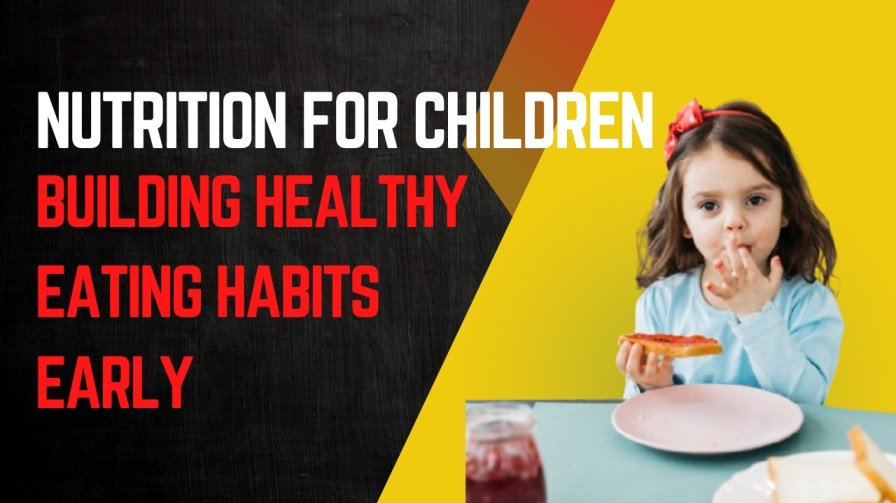Nutrition for Children: Building Healthy Eating Habits Early

Good nutrition is one of the most important foundations for a child’s healthy development. From infancy to adolescence, the food children eat plays a crucial role in shaping their physical growth, brain development, energy levels, behavior, and even their future health. Building healthy eating habits early not only helps children grow strong and smart, but it also prevents many chronic diseases later in life such as obesity, diabetes, and heart disease.
The Importance of Early Nutrition
During the early years, children are growing rapidly. Their bodies and brains require a variety of essential nutrients to function properly. These nutrients include proteins for muscle and tissue development, calcium and vitamin D for strong bones, iron for healthy blood, and vitamins and minerals for overall health and immune function.
A child who receives proper nutrition is more likely to:
- Do well in school
- Be physically active and energetic
- Have a strong immune system
- Maintain a healthy weight
- Develop good concentration and learning ability
Without good nutrition, children may experience stunted growth, poor academic performance, frequent illnesses, and behavioral issues. That’s why it’s so important for parents and caregivers to focus on building healthy eating habits from the beginning.
What Are Healthy Eating Habits?
Healthy eating habits include choosing foods that are rich in nutrients, eating a balanced diet, and developing a positive attitude towards food. These habits are not only about what children eat, but also how and when they eat.
Here are some key aspects of healthy eating habits:
- Balanced Meals
Each meal should include a mix of food groups: fruits, vegetables, whole grains, proteins (like beans, meat, eggs, or fish), and dairy. This variety ensures that children get all the necessary nutrients they need every day. - Regular Meal Times
Eating at consistent times (breakfast, lunch, dinner, and snacks) helps regulate a child’s metabolism and prevents overeating. Skipping meals can lead to unhealthy cravings and poor energy levels. - Portion Control
Children should learn to listen to their hunger and fullness cues. Overeating can lead to weight problems, while under-eating can lead to nutritional deficiencies. - Limiting Sugar and Junk Food
Sweets, sodas, and processed snacks should be limited. These foods are high in calories but low in nutrients and can cause tooth decay, weight gain, and other health issues. - Staying Hydrated
Water is the best drink for children. Sugary drinks and sodas should be avoided as much as possible. Milk and natural fruit juices in moderation are also healthy choices.
How to Encourage Healthy Eating in Children
Parents and caregivers play a vital role in shaping children’s food preferences and attitudes. Here are some effective ways to encourage healthy eating habits:
- Be a Good Role Model
Children often copy what they see. If parents eat vegetables, try new foods, and avoid junk, children are more likely to do the same. - Make Mealtimes Positive
Avoid pressure, force, or punishment related to food. Mealtimes should be pleasant and relaxed, not stressful. - Involve Children in Meal Preparation
Letting kids help with shopping, cooking, or serving meals increases their interest in healthy food and makes them more likely to try new things. - Offer Healthy Choices
Instead of asking “What do you want to eat?” ask, “Do you want apples or bananas for a snack?” Giving limited healthy options helps children feel in control while keeping the choices nutritious. - Educate About Food
Teach children where food comes from, how it helps the body, and why eating well is important. Fun stories, games, and videos about healthy eating can be very effective.
Common Challenges and Solutions
Sometimes, getting children to eat healthy is not easy. Picky eaters, busy schedules, or limited food options can be obstacles. Here are a few common problems and tips to overcome them:
- Picky Eating
It’s normal for children to be picky. Offer new foods repeatedly in small amounts without pressure. Sometimes it takes 10–15 tries for a child to accept a new taste. - Busy Families
Preparing quick, healthy meals in advance, such as chopping vegetables or cooking in batches, can help families stay on track. Avoid relying on fast food or pre-packaged meals too often. - Limited Budget
Healthy eating doesn’t have to be expensive. Foods like rice, beans, eggs, seasonal fruits, and vegetables are nutritious and affordable.
The Long-Term Benefits of Healthy Habits
When children develop healthy eating habits early, they are more likely to carry them into adulthood. This means they are less likely to suffer from chronic diseases, more likely to maintain a healthy weight, and better equipped to live an active lifestyle. Furthermore, these habits also support emotional well-being, confidence, and self-esteem.
Healthy eating also promotes good social and family interactions. When families eat together, children learn communication, table manners, and the value of shared routines.
Conclusion
Nutrition for children is about more than just food — it’s about setting the stage for a lifetime of wellness. Building healthy eating habits early in life ensures children grow up healthy, strong, and ready to face the world. With love, support, and smart food choices, every parent and caregiver can help children develop a healthy relationship with food that lasts a lifetime.
Encouraging good nutrition is an investment in our children’s future. Start small, be consistent, and remember that every healthy bite counts.






